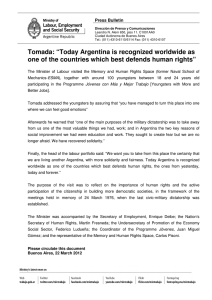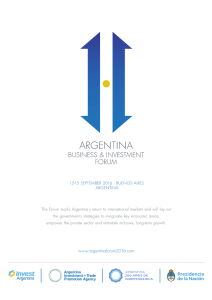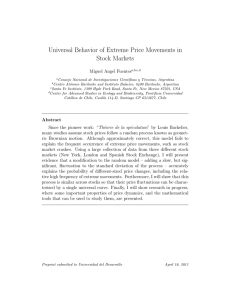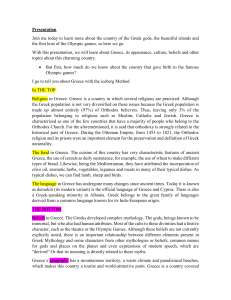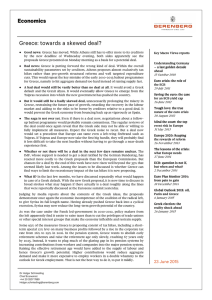Greece should restructure its debt but stay in the
Anuncio
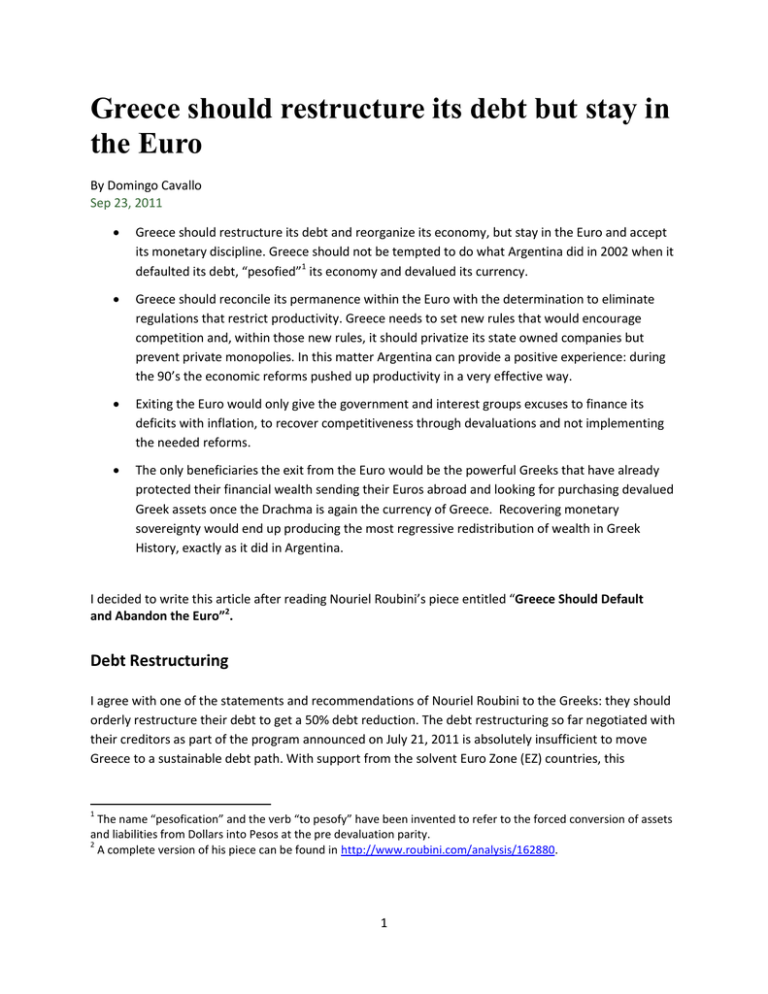
Greece should restructure its debt but stay in the Euro By Domingo Cavallo Sep 23, 2011 Greece should restructure its debt and reorganize its economy, but stay in the Euro and accept its monetary discipline. Greece should not be tempted to do what Argentina did in 2002 when it defaulted its debt, “pesofied”1 its economy and devalued its currency. Greece should reconcile its permanence within the Euro with the determination to eliminate regulations that restrict productivity. Greece needs to set new rules that would encourage competition and, within those new rules, it should privatize its state owned companies but prevent private monopolies. In this matter Argentina can provide a positive experience: during the 90’s the economic reforms pushed up productivity in a very effective way. Exiting the Euro would only give the government and interest groups excuses to finance its deficits with inflation, to recover competitiveness through devaluations and not implementing the needed reforms. The only beneficiaries the exit from the Euro would be the powerful Greeks that have already protected their financial wealth sending their Euros abroad and looking for purchasing devalued Greek assets once the Drachma is again the currency of Greece. Recovering monetary sovereignty would end up producing the most regressive redistribution of wealth in Greek History, exactly as it did in Argentina. I decided to write this article after reading Nouriel Roubini’s piece entitled “Greece Should Default and Abandon the Euro”2. Debt Restructuring I agree with one of the statements and recommendations of Nouriel Roubini to the Greeks: they should orderly restructure their debt to get a 50% debt reduction. The debt restructuring so far negotiated with their creditors as part of the program announced on July 21, 2011 is absolutely insufficient to move Greece to a sustainable debt path. With support from the solvent Euro Zone (EZ) countries, this 1 The name “pesofication” and the verb “to pesofy” have been invented to refer to the forced conversion of assets and liabilities from Dollars into Pesos at the pre devaluation parity. 2 A complete version of his piece can be found in http://www.roubini.com/analysis/162880. 1 restructuring could be achieved with much lower costs for the European taxpayers than the costs that would be paid if the EZ solvent countries continue bailing out Greece’s creditors. The European Financial Stability Fund (EFSF) should issue debt guaranteed by EZ countries by 175 billion Euros and lend it to Greece. Greece should offer its creditors to exchange this EFSF debt by its 350 billion dollars debt, capturing the discount the market is already reflecting on the real value of Greek Debt. If instead of making it possible this debt exchange, EZ countries continue bailing out Greece Creditors, the cost for European taxpayers will end up being 350 Billion Euros, that is, twice the cost of the bail in operation. Actually, the cost for European taxpayers will probably be only the discount on the Greek Debt that it is already in public hands, because after a few years Greece, under the new conditions, will have again the ability to service its Debt to the EFSF with its own resorces. Even if EZ countries will have to make an additional fiscal effort to recapitalize banks, the cost of the orderly debt restructuring will always be smaller than that that would emerge from a disorderly Greek default Argentina’s style. Greece would be forced to continue its efforts for fiscal consolidation because it would not get credit from the markets to continue financing a fiscal deficit, and if it needs to borrow additional ESFS debt, Europe can impose conditionality that would entail a European control of its fiscal policies. For Greece it will be politically much easier to build support for a program of fiscal consolidation if it is not done to service a huge debt but to restore Greece competitiveness. Greece should not imitate Argentina 2002 I completely disagree with the rest of the statements and recommendations of Nouriel Roubini. And I particularly disagree with his description of what actually happened in Argentina during the 2001 crisis and its aftermath. In Argentina Austerity did not aggravate the recession until the end of 2001 .Let’s start with the first two statements of Nouriel on Argentina: “Argentina in 1999-2001 fell into the same trap of deficit, austerity, deeper recession, depression, higher deficit, greater insolvency” “Argentina tried the deflation route to a real depreciation and, after three years of an ever-deepening recession/depression, it gave up and decided to default and move off the currency board peg with the U.S. dollar”. Actually austerity only for the last semester of 2001 may have aggravated recession. In July 2001, the government decided to recover confidence of the markets by committing to a balanced budget policy without immediately demanding from the creditors, particularly the local banks that had lent to the provinces, significant reductions in interest charges. This program was supported by an augmentation of 8 billion dollars of the program that had been negotiated with the IMF in December of 2000. Unfortunately, by November 2001, when the Government was in the middle of the implementation of an orderly restructuring of the debt 2 that had already delivered 4 billion dollars of annualized interest cost reduction, the IMF withdraw the support and provoked a run against the banks. As of 2000, Argentina did not have a big fiscal problem. Actually, between 1991 and 2000 the fiscal deficit was on average 1.6 % of GDP with a primary surplus of 1% of GDP. The higher fiscal deficit occurred in 2000 and amounted to 3.6% of GDP. The increase had its origin in higher interest costs for the debt. In 2000 Argentina still had a primary surplus of 0.7% of GDP. The recession of 1999 had nothing to do with fiscal austerity. On the contrary, the excessive fiscal expansion of the provinces that were willing to pay high interest rates to the banks provoked a credit crunch to the private sector. It affected private enterprises at a time when a sudden drop in terms of trade and a big devaluation in Brazil was affecting their cash flows. The austerity measures adopted by the administration of President De la Rúa in 2000 did not aggravate the recession of 1999. GDP, which in 1999 had dropped 3.4%, in 2000 dropped only 0.8% and by the second quarter of 2001 was dropping at an almost negligible 0.2 % rate. This adjustment in the level of economic activity had been enough to turn a trade deficit of almost 5 billion dollars in 1998 into an annualized trade surplus of 2.5 billion by mid 2001 and 6 billion dollars for the 12 months of 2001. During 2000 and the first semester of 2001, the internal devaluation that was achieved not so much through deflation but through cuts in payroll taxes and removal of regulation that restricted productivity was paying off. It had started to soften the recessionary impact of the devaluation of the Real and the falling terms of trade associated with the strong Dollar of those years. The best indicator that the internal devaluation was producing good results is reflected in the increased exports of 2000 and 2001. Exports increased from 23,3 billion dollars in 1999 to 26,3 billion dollars in 2000 and 26.5 billion dollars in 2001. This happened in spite of the fact that the terms of trade continued deteriorating along 2000 and 2001. The debt problem of Argentina was not so much the external debt of the public and private sectors (that amounted to around 50% of GDP), but a very expensive debt of some provincial governments with the local banks. This debt was not that large (it amounted to 6% of GDP) but it had been borrowed at floating interest rates. When interest started to increase during the last quarter of 2000 -as a consequence of the of the capital outflows- the interest cost of this debt amounted to 4 billion dollars per year for a principal of around 20 billion dollars. Just for comparison, the cost of the public debt of the Federal government was 8 billion dollars for a principal close to 120 billion dollars. The creditors of the banks and the depositors started to fear that the banks would become insolvent not because the debt of the Federal Government but mainly because the debt of the Provincial Governments who could not continue servicing their debts at those very high interest rates. Renewal of growth did not come from the return to a national currency and a sharp devaluation. Inflation did! The third statement of Nouriel on Argentina is the following: “Only a return to a national currency and a sharp depreciation of that currency would quickly restore competitiveness and 3 growth, as it did in Argentina, which rapidly moved from a current account deficit to a surplus and from depression to high growth.”… “Take the example of Argentina: Until December 2001, GDP was free falling, dropping by an annualized rate of 20%; three months later, in March 2002, after a default and move from a currency board to floating rate, the economy started to grow at an annual rate of 8%, and has grown at very rapid rates for a decade since. The usual argument that Greece doesn’t have much of a competitive advantage is as inane for Greece as it was for Argentina; then, it was argued that Argentina, with exports representing barely 10% of GDP, could never compete, even if it had a weaker currency; but that argument was proven to be utterly wrong when Argentine exports boomed following the depreciation.” The statements are objectively inaccurate. The Argentine exports did not boom following the depreciation. Actually in 2002 exports decreased from 26.5 billion dollars in 2001 to 25.6 billion in 2002. And the increase since 2003 was mainly due to the increase in export prices. Export volumes expanded between 2003 and 2010 at the same pace they had expanded between 1991 and 1998, at the time of the fixed exchange rate. It is not true that until December of 2001 GDP was falling at a rate of 20%. Actually, between the fourth quarter of 2000 and the same quarter of 2001 GDP fell 10.5%. It fell even more during the first and second quarters of 2002. The drop in GDP between the first quarter of 2001 and the first quarter of 2002 was 16.3 % and between the second quarter of 2001 and the second quarter of 2002 the drop was still 13.5 %. It was only in the second semester of 2002 that GDP recovered to the level of the second semester of 2001. And this recovery of growth did not come from exports, but from a sharp reduction of imports, reflecting that domestic consumption plus investment continued falling during the whole year. The growth after 2003 did not come from the recovery of competitiveness but from the impressive increase in the terms of trade that since 2003 had been benefiting all export commodity countries. If there was some recovery of competitiveness it came not from the devaluation but from the weakening of the dollar in relation to the Real and the Euro. As it was mentioned before, the export volumes expanded at the same pace as they had increased during the initial eight years of the convertibility program. After 2006, GDP growth originated in very expansionary monetary policy. As a consequence inflation accelerated. In 2011 the inflation rate is 25 % per year. Neither is it true that the trade account turned from a deficit in 2001 to a big surplus in 2002. On the contrary, in 2001 the trade balance was already in surplus. The surplus amounted to 6.2 billion dollars. The jump in the surplus to 16.7 billion dollars in 2002 came from a more than 11.4 billion dollars reduction in imports because exports decreased after the devaluation, exactly the opposite of what Nouriel argues in this statement. The IMF unplugged Argentina before the devaluation and by doing so it forced disorderly default. Next there is another inaccurate statement on the attitude of the IMF: “One of the big mistakes of the official sector approach to Argentina must be avoided in the case of Greece. 4 The IMF was very generous with Argentina for years to prevent an unavoidable default and devaluation; but once that default and devaluation eventually occurred, it fully pulled the plug and provided none of the financial support that was necessary to manage the collateral damage of those unavoidable decisions. As a consequence, Argentina suffered a massive overshooting of its exchange rate, a huge temporary increase in its inflation rate and major financial sector disruption and near meltdown.” Actually the IMF pulled the plug before the devaluation and, very likely, with the intention of forcing Argentina to default and devalue. If that were not the case, it is impossible to understand why it pulled the plug in the middle of the implementation of the orderly debt restructuring that the IMF had been demanding as a “Private Sector Involvement” in the solution of the crisis. The massive overshooting of the exchange rate originated in the pesofication itself: Argentines that had been saving in dollars, were suddenly told to have their assets in non convertible pesos so they desperately tried to convert their stock of pesos into dollars causing this extreme overshooting. Inflation became endemic in Argentina after the return to a national currency. Next, more inaccuracies, this time referred to inflation: “The risk that a Greek default and EZ exit will lead to high inflation or even hyperinflation in Greece is also vastly exaggerated. The same claims were made about Argentina when it defaulted and moved to a floating rate. But, even in a country like Argentina, with a long history of inflation and hyperinflation, the move to a float did not lead to hyperinflation as some scaremongers had wrongly predicted; inflation spiked for a year after the exchange rate overshot its fundamental value, but then it rapidly returned to low double digits”. .. “As the experience of Argentina shows, even in the absence of such official resources, inflation—after a first-year burst—can be contained at modest levels as the default and exit leads to growth and to greater fiscal discipline, given the binding constraints of limited domestic and external bond financing. And experience suggests that floating exchange rates provide greater fiscal market discipline than fixed rates or monetary unions as, under flexible exchange rates, policy slippages automatically lead to upward pressure on interest rates and downward pressure on the currency value. Joining the monetary union had disastrous effects on the incentives for fiscal discipline in Greece”. The inflation rate in Argentina in 2002 was 41%. The fall to 4.4% in 2004 was a result of an extremely distortive freeze in public utilities and energy prices and wild price controls that after some years provoked very costly shortages of supply. The best example of those distortive price controls was that applied to beef. The combination of price controls and bans on exports of beef kept it price almost constant during three years, but then the livestock was severely reduced and afterwards the price of beef tripled. Argentina that until then had been an important exporter of beef, was not producing enough to satisfy domestic demand of beef! The same happened with oil and gas. Due to the price freeze, in a few years Argentina went from being an exporter of energy to becoming a large importer. The price freeze that reduced inflation forced the government to start paying subsidies to the producers of energy and public utilities. Nowadays these subsidies represent 4 % of GDP. 5 Inflation started to accelerate again in 2005 and in 2011 is running at a rate of 25 % per year. Argentina is the country with the second highest inflation in the world, second only to Venezuela. The best proof that floating exchange rates do not impose greatest market discipline comes also from Argentina. While during the 90’s the expenditure of the Public Sector averaged 25% of GDP, during the last years public expenditure represents 35 % of GDP. The revenue necessary to finance that very high level of expenditure came from either distortive taxes, like those applied to agricultural exports or from inflation itself. The Central Bank takes as profits the permanent revaluation of foreign reserves and then prints money to transfer those “profits” to the Government. The Central Bank is using its “sovereign” monetary policy to expand money supply at a rate of 40% per year. That way it can maintain interest rates well below the inflation rates. Of course, since 2007 there has been a huge capital flight: more than 50 billion dollars. That is the growth strategy of Argentina. If Argentina had avoided pesofication and devaluation, growth had been more sustainable and non inflationary. The counterfactual Nouriel does on Argentina is also non-defendable: “Which social, political, economic and financial disaster would Argentina have faced if it had followed a policy of deflation and depression? Most likely, the result would have been a 1930s-style depression that would have resulted in the same social and political instability and unrest—or most likely, worse—than that which resulted from the default and exit from the currency board.” If Argentina had concluded its orderly debt restructuring without defaulting and without devaluing, in 2002 the interest bill of the public sector would have been 5 billion dollars rather that the 12 billions of 2002. Actually, by the end of November, with the successful closing of the first stage of the restructuring, which comprised mainly domestic debt, Argentina had already reduced its interest bill by 4 billion dollars per year. And still was possible to get an extra reduction of 3 billion dollars by offering a swap to foreign creditors after the government had already accumulated enough voting power to impose exit consent clauses on the bonds that were not redeemed. So the success of the second stage of the orderly restructuring process was reassured. The competitiveness would have been restored in a few months as the dollar started to depreciate in relation to most of the currencies of the world, particularly in relation to the Real and the Euro. And Argentina would have benefited from the turnaround of the terms of trade with an economic organization free of distortions and inflation. The growth would have higher and, for sure, much more sustainable that the one that is being shown as a great success when in practice is completely unsustainable. Argentina would have avoided the terrible riots of 2002. The riots that people saw on TV and the extreme manifestations of poverty and unemployment occurred in 2002, after the default, the pesofication and the devaluation. As a consequence of this exit strategy that Nouriel recommends to Greece, poverty jumped from 24 % of the households in October 2001 to 40 % of the households in May 2002. Unemployment also increased from 18 % in the second semester of 2001 to 22 % in the first semester of 2002. Could you imagine what would 6 be the reaction of the Greeks if something similar were to happen in that country after exiting the Euro? And if inflation becomes again a way to finance the deficits and devaluations the mechanism to restore competitiveness, can you imagine where would inflation end up being in Greece? The cost that Greece will pay if exits the Euro and devalues the new Drachma. In fact, Nouriel Roubini knows that the transition may be very costly for the Greek People. Somehow hidden in the middle of his article, the following paragraph can also be read: “In Argentina the transition was very ugly and costly: Riots and blood in the streets and dozens of deaths; massive social and political instability and five different presidents in one year; a deposit freeze in the banking system; capital controls; asymmetric pesification and the need to recapitalize insolvent banks; the loss of external market access; a sharp short-term rise in poverty and unemployment (before high growth rapidly cut both); inward-looking economic policies and political economy; the retardation of economic reforms; a sharp fall in inward FDI; and an overall change in economic policies toward long-term populism and policy mismanagement. So, breaking up is hard and costly to do and every country considering it should be fully aware of the risks of such collateral damage. And if a society finds such costs unbearable it should stick to the policy sacrifices necessary to avoid that painful break-up”. The purpose of this article is precisely to provide the Greeks with correct information of what happened in Argentina in 2002 which is not at all well described by Nouriel Roubini in his paper. I am sure that the policy sacrifices necessary to avoid the painful break-up from the Euro are significantly lower than the cost that Greeks would have to bear if they follow Noriel’s advice to abandon the Euro. Conclusion Greece should restructure its debt and reorganize its economy, but stay in the Euro and accept its monetary discipline. Greece should not be tempted to do what Argentina did in 2002 when it defaulted its debt, “pesofied” its economy and devalued its currency. Greece should reconcile its permanence within the Euro with the determination to eliminate regulations that restrict productivity. Greece needs to set new rules that would encourage competition and, within those new rules, it should privatize its state owned companies but prevent private monopolies. In this matter Argentina can provide a positive experience: during the 90’s the economic reforms pushed up productivity in a very effective growth. Exiting the Euro would only give the government and interest groups excuses not to implement the needed reforms, to finance its deficits with inflation and to recover competitiveness through devaluations. The only beneficiaries the exit from the Euro would be the powerful Greeks that have already protected their financial wealth sending their Euros abroad and looking for purchasing devalued Greek assets once 7 the Drachma is again the currency of Greece. Recovering monetary sovereignty would end up producing the most regressive redistribution of wealth in Greek History, exactly as it did in Argentina. Greece should restructure its debt and reorganize its economy, but stay in the Euro and accept its monetary discipline. In reorganizing its economy it should try to imitate what Argentina did during the 90’s: push up productivity growth in its economy, but not what Argentina did in 2002 when it decided to default, to “pesofy” and to devalue. Greece should reconcile its permanence within the Euro with the determination to eliminate regulations that restrict productivity. Greece needs to set new rules that would encourage competition and, within those new rules, it should privatize its state owned companies or maintain them as state controlled companies but not as monopolies. Exiting the Euro would only give the government and interest groups excuses not to implement the needed reforms, to finance its deficits with inflation and to recover competitiveness through devaluations. The only beneficiaries of such an exit strategy would be the powerful Greeks that have already protected their financial wealth sending their Euros abroad and looking for purchasing devalued Greek assets once the Drachma is again the currency of Greece. Recovering monetary sovereignty would end up producing the most regressive redistribution of wealth in Greek History, exactly as it did in Argentina 8
